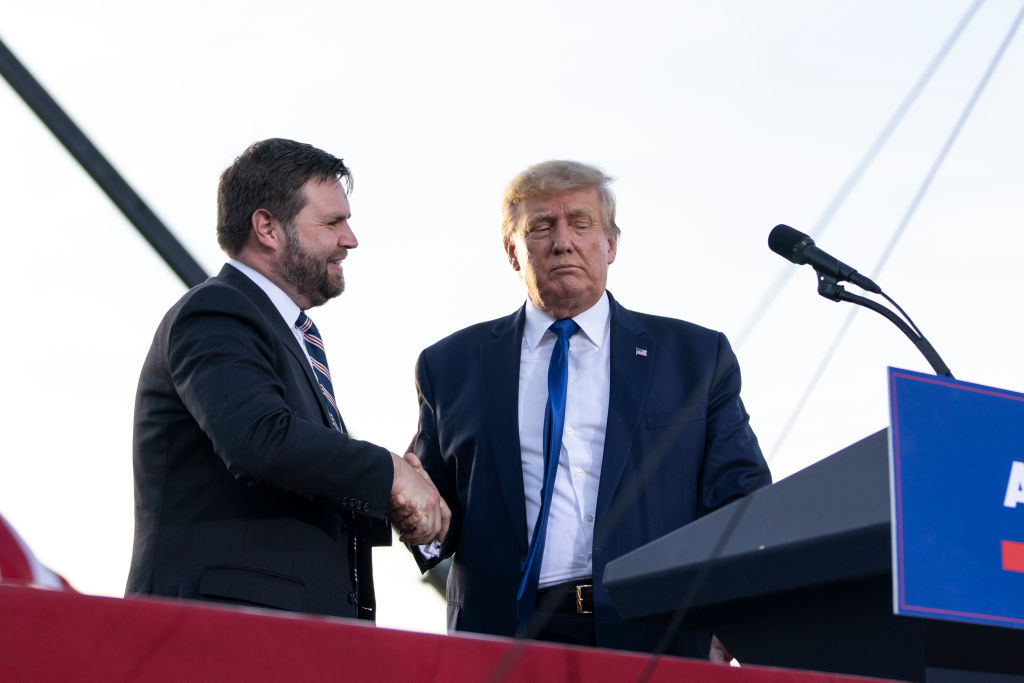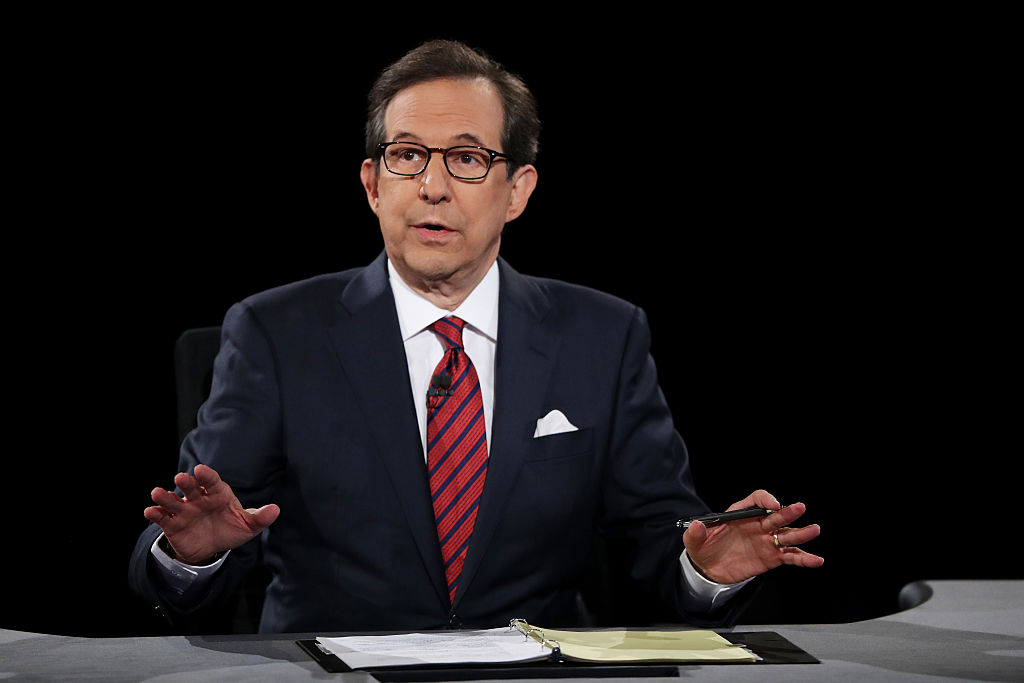What Is Required to Convict a Person of Treason? Again Give the Answer in the Constitution
Skip to headerSkip to main contentSkip to footer
A cursory history of treason in the United states
Accent on brief
"What makes treason here?" asks Ferdinand in Dear's Labour'southward Lost. Unless you have been living under a rock in Outer Mongolia, yous might exist asking yourself the same question. On Monday, President Trump accused his critics of treason. Many of them have responded in kind, including Bill Weld, an ostensible challenger to the Republican presidential nomination. Both men are participating in a rhetorical tradition that is as old every bit the American commonwealth.
The history of actual treason, in the sense of federal criminal prosecutions for the concept defined in the Constitution and adopted almost immediately as a federal offense, is remarkably short. Since the ratification of the Constitution in 1789, at that place take been just 40 federal treason cases, and far fewer convictions. (John Adams secured the passage of the Conflicting and Sedition Acts in part considering the constitutional definition of treason was as well narrow.) Even the about famous "traitors" in American history were not technically guilty of treason. Benedict Arnold might plausibly have argued that it was those on the side he betrayed who were guilty of treason; Julius and Ethel Rosenberg were really convicted of conspiracy to engage in espionage.
Otherwise the record is remarkably sparse. In 1794 Philip Vigol and John Mitchell were bedevilled of treason for their part in the Whiskey Rebellion and sentenced to death. Both were pardoned past President George Washington. Six years later, John Fries, the leader of the eponymous rebellion, was convicted of the aforementioned offense; he also received a pardon, from John Adams. Aaron Burr was rather famously acquitted in 1807. In April of 1862, William Bruce Mumford was institute guilty of treason afterward removing an American flag planted by Matrimony Marines atop a mint in New Orleans. Mumford was hanged. During this period, u.s.a. also occasionally secured convictions for treason. John Dark-brown was executed in 1859 for crimes against the Democracy of Virginia, not the Us. Joseph Smith was charged with treason by the governments of both Missouri and Illinois; he was killed by a mob in 1844.
In the 20th century, not a single person was put to death for the criminal offence defined as "State of war against [the United states of america], or in adhering to their Enemies, giving them Aid and Comfort." Walter Allen was convicted of treason in 1922 for his part in the Battle of Blair Mountain, the climax of the West Virginia coal wars. He was given a sentence of 10 years and fined, but would later disappear while out on bail pending an entreatment before the Supreme Court. Ii decades later several German Americans were convicted for assisting a German sabouteur; Martin James Monti, an Air Force pilot, defected to the South.S. in 1944 and was later on sentenced to 25 years before receiving parole in 1960. Tokyo Rose was convicted in 1949, as was Centrality Sally; the former was pardoned by Gerald Ford, the latter served 12 years. Tomoya Kawakita was sentenced to death in 1952 for abusing American POWs in Japan during the state of war merely would be deported past the Kennedy administration. The Nazi propagandists Herbert John Burgman and Robert Henry Best both died in the same Springfield, Missouri, prison. In 1990, the death penalty for treason was formally abolished. In 2015, Adam Yahiye Gadahn, the Oregon-built-in al Qaeda hype human, was killed past a drone in Pakistan.
This more or less exhausts the legal history of treason. Its rhetorical vein is much richer, and in that location is good reason to retrieve information technology will never be wearied. Washington and Alexander Hamilton repeatedly defendant their critics of treason. Thomas Jefferson insisted in 1791 that anyone who had business concern with the newly established Depository financial institution of the United States was guilty of treason and should "be adjudged guilty of loftier treason and suffer death accordingly." This did not happen, and later on 1803 such accusations became infrequent. After the Ceremonious War there were frequent calls for the leaders of the Confederacy to be charged with treason, merely the precedent established past Grant'due south blanket amnesty at Appomattox was honored at subsequent surrenders, and enshrined in constabulary by Andrew Johnson in 1869.
The modern rhetorical history of treason really begins in the centre of the 20th century. It is here that we see a revival of treason every bit a kind of catch-all for one's partisan opponents, which is how it had been deployed in the struggles between Federalists and Republicans in the early history of the republic. In 1954, Joseph McCarthy accused the unabridged Democratic party of "20 years of treason." He was met with raucous applause by a crowd of 6,200 supporters. By the time that Ann Coulter (a future biographer of the Wisconsin senator) published her eponymous bestseller, Treason: Liberal Treachery from the Cold State of war to the War on Terrorism, in 2003, treason had already become the watchword of George W. Bush-league'southward opponents on the fringes of the left.
With the inauguration of Barack Obama all bets were off — or rather, they were all in, at any odds, on the action that he had committed treason. When Obama bowed to the emperor of Japan, it was treason. In 2022 Ted Cruz bungled Cicero in an endeavour to charge Obama of being "openly desirous to [sic] destroy the Constitution and this Commonwealth," which is treason without the word. The same year, a GOP candidate in Florida called for Obama'due south execution for treason. Nor was Obama himself the just fellow member of his assistants with whom the word would become synonymous among Republicans. Hillary Clinton was repeatedly accused of treason both during and long after her tenure as secretary of state. One New Hampshire lawmaker (and sometime adviser to our electric current president) even suggested that she should be executed by firing squad. In 2011, George Duff, who maintained that Obama was guilty of treason against the United states of america despite non believing that the president was a denizen of this land, was convicted in a terrorist plot to seize a courthouse in Tennessee.
Republicans were not alone in this activeness. Past the cease of the administration it had become common for the president'due south supporters to accuse GOP senators who disagreed with, for example, the administration's Iranian policy of brushing up against treason. At that place were even meta-debates about whether wishing for Obama's failure in fact constituted treason. (Around the aforementioned fourth dimension in that location was also a smashing bargain of talk amidst liberals nigh the necessity of making the impeachment procedure much more than difficult.) By the end of Obama's 2nd term even Republican senators' refusal to push forward Merrick Garland'south nomination to the Supreme Courtroom was "tantamount to treason."
But all of this pales in comparison with the Trump era, during which I doubt a unmarried calendar week has gone by without a discussion of treason either by or from Trump and his supporters appearing in a major media outlet. In the halcyon days of June 2016, it was still possible for The Washington Mail service to ask in a headline "Is Donald Trump suggesting that Barack Obama committed treason?" I call back it is off-white to assume that the columnist's query has since been answered — "answered" in the double sense that it is both articulate across any incertitude that Trump has indeed defendant Obama, Clinton, and numerous other opponents of treason and obvious that his own critics are just every bit willing to level the same charge confronting him for near everything, including making jokes during press conferences.
This has continued well after Trump'south inauguration and kept pace e'er since. By 2022 some observers were detecting a whiff of treason in Washington; for others the "smell of treason in the air" was general, diffuse, all-pervading. It was asked whether in that location is a proper emoji for treason. It was even suggested past a flag-throwing protestor that in some kind of baroque ontological sense that "Trump is treason." A not-exhaustive listing of persons other than Trump himself who accused of treason earlier, during, or after the special counsel's Russia investigation includes Michael Flynn, Donald Trump, Jr. (including by his male parent's former vice-presidential rival Tim Kaine amongst others), and Jared Kushner.
What explains the popularity of this unusually precise legal term as a partisan epithet? The fact that it places 1's enemies outside the premises of any is supposed to establish normal American political discourse. The terms of the conflict change. The quarrel is no longer a prudential disagreement about the best means of securing the mutual skillful, but a noble struggle to extirpate an conflicting element from the body politic. A traitor cannot argue for or explicate away his actions; he can accept no recourse to questions most his motivations. Information technology is not difficult to see why the tool would be wielded ofttimes and enthusiastically past both of our major political parties.
A more important question is whether these accusations of treason are dangerous. In one sense the answer, I recall, is manifestly no. Any discussion whose currency has been and then thoroughly debased is all but meaningless. It might be argued that a would-be contest of ideas — yous know, the whole democracy affair — between two factions who each insist that the other has forfeited its correct to take part at all is non i that is likely to inspire confidence or good faith, much less safeguard the common good. But this, I call up, would mean confusing a symptom for a cause.
Want more than essential commentary and assay like this delivered straight to your inbox? Sign upwardly for The Week'due south "Today's best articles" newsletter here.
Recommended
Trump touts J.D. Vance at Ohio rally

Trump touts J.D. Vance at Ohio rally
x things you need to know today: Apr 24, 2022

ten things you lot need to know today: Apr 24, 2022
Labor lath sues Starbucks subsequently coffee chain fires 3 marriage organizers

Labor board sues Starbucks after coffee chain fires 3 union organizers
Will Saturday's Trump rally propel J.D. Vance to victory in Ohio?

Volition Saturday's Trump rally propel J.D. Vance to victory in Ohio?
Most Popular
Bill Murray moving picture suspends production after he's accused of 'inappropriate behavior'

Pecker Murray movie suspends production after he's accused of 'inappropriate beliefs'
What's adjacent for Chris Wallace later on end of CNN+?

What's next for Chris Wallace after end of CNN+?
Colin Kaepernick won't make information technology as a backup in the NFL

Colin Kaepernick won't brand information technology every bit a backup in the NFL
Skip to headerSkip to principal contentSkip to footer
cunninghampany1953.blogspot.com
Source: https://theweek.com/articles/869173/brief-history-treason-united-states
0 Response to "What Is Required to Convict a Person of Treason? Again Give the Answer in the Constitution"
Post a Comment